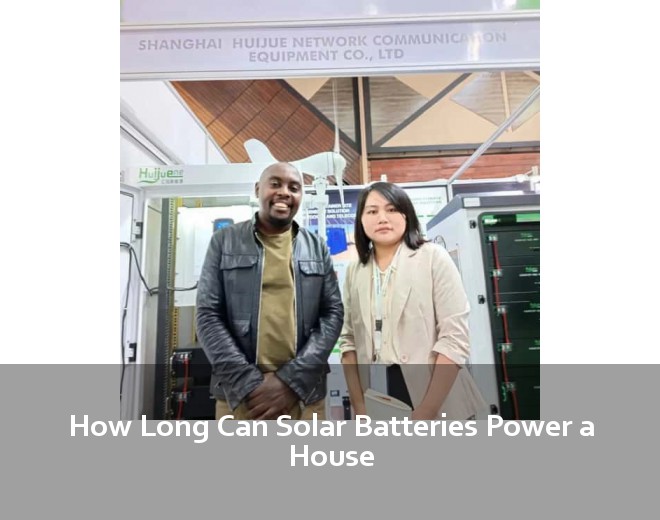How Long Can Solar Batteries Power a House

Table of Contents
The Short Answer (and Why It's Incomplete)
So, how long can solar batteries power a house? Well, here's the frustrating truth: anywhere from 6 hours to 3 days. But that's like saying "a car can drive between 50 and 500 miles" – technically true, but utterly useless for planning your road trip. Let's unpack what really matters.
In California's latest blackout season, the Smiths in Sacramento kept their lights on for 19 hours straight using a single Tesla Powerwall. Meanwhile, the Wagners in Munich once lasted 61 hours during a snowstorm. Same battery tech, wildly different outcomes. Why?
Battery Capacity vs. Your Netflix Habit
Battery capacity (measured in kWh) is your fuel tank size. But here's the kicker – the average U.S. home guzzles 30 kWh daily, while German households sip just 15 kWh. That's why a 10kWh system might last:
- 8 hours for an energy-hungry American home
- 16 hours for a frugal European household
Wait, no – that's not the whole story. Modern lithium-ion batteries (Tier 2: technical spec) can discharge up to 90% of their capacity, unlike older lead-acid systems. So that 10kWh battery? Actually, you're really working with 9kWh.
When Clouds Crash the Party: Weather-Proofing Your Power
Solar batteries aren't gas generators – they need sunshine to recharge. During Japan's 2023 rainy season, some hybrid systems switched to grid-charging automatically. Clever, right? But in Texas' winter storms, where both sun and grid failed, homeowners with solar battery backups became neighborhood heroes.
Consider these 2024 stats:
| Scenario | Backup Duration |
|---|---|
| Cloudy day recharge | 40-60% capacity |
| Full sunlight recharge | 100% in 6-8 hours |
Real-World Scenarios From Texas to Tokyo
Let's picture two homes:
- A Sydney bungalow with 14kWh battery and 6kW solar array
- A London townhouse with 8kWh battery and 3kW system
During Australia's bushfire season, the Sydney home could power essentials for 3 days without sun. But the UK home? Maybe 18 hours. The difference comes down to panel-to-battery ratios – something most installers don't explain clearly.
5 Ways to Stretch Your Power Reserve
Want to maximize your solar battery power duration? Try these pro tips:
- Pair with DC-coupled systems (15% more efficient than AC)
- Install smart circuit breakers to prioritize vital loads
- Use time-of-day settings – your fridge doesn't need full power at 3AM
In Hawaii, where grid electricity costs $0.35/kWh, homeowners are stacking batteries like Lego blocks. The Jones family in Oahu combines four Powerwalls with a diesel generator – their "belt and suspenders" approach keeps their B&B running 99.9% of the time.
Burning Questions Answered
Q: Can I power my AC continuously during a blackout?
A: Depends. A 3-ton AC unit eats 3-4kW per hour. With a 10kWh battery, you'll get 2-3 hours – unless you use a variable-speed compressor.
Q: Do I need multiple batteries for whole-house coverage?
A: Not necessarily. New hybrid inverters can manage partial home backup smartly.
Q: Will solar batteries work completely off-grid?
A: They can, but you'll need at least 3 days of battery storage and oversized solar panels. Alaska's midnight sun helps; Seattle's drizzle? Not so much.
Q: How does battery lifespan affect performance?
A: Lithium batteries degrade about 2% annually. After 10 years, your 10kWh system becomes 8kWh – plan accordingly.
Q: Are there regional differences in effectiveness?
A: Absolutely. Arizona homes recharge faster but face more cooling demands. Norwegian systems prioritize heating over other loads.
Related Contents

A House Using Solar Power Hydro Power and Wind Power
Ever opened your utility bill and felt that sinking dread? You’re not alone. The average U.S. household spends $1,500 annually on electricity—money that literally goes up in smoke. Now picture this: What if your home could generate its own power using solar panels, a mini hydro turbine, and a wind generator? No more grid dependency, no more rate hikes.

How Long Can Solar Panels Power a House
Well, here's the thing – solar panels alone can't power your home 24/7. You know why? Sunshine isn't a never-ending buffet. In the U.S., average daily sunlight ranges from 3 hours in Alaska to 6.5 hours in Arizona. But wait, no – that's just peak production. The real magic happens when you combine panels with battery storage systems.

Can Solar Panels Power House During Power Outage?
You've probably wondered: "Can my rooftop solar system keep the lights on when the grid goes down?" Well, here's the kicker – standard grid-tied solar installations automatically shut off during outages for safety reasons. Wait, no – that's not the whole picture. Actually, modern systems with battery storage can provide continuous power, but there's more nuance than most installers admit.

A House Using Solar Power Hydropower and Wind Power
Ever opened an electricity bill and felt that sinking sensation? You're not alone. While fossil fuels power 84% of global homes, households in places like California now spend 35% more on energy than they did five years ago. But what if your house could become its own power plant?

Long Island Power Authority Solar
Long Island Power Authority solar programs aren't just about saving polar bears anymore. When your neighbor's AC unit sounds like a jet engine during August blackouts, renewable energy becomes personal. Last summer's grid strain caused 12% more outages than 2022, pushing many residents to ask: "Why can't we harness that blazing sun instead of cursing it?"




 Inquiry
Inquiry Online Chat
Online Chat